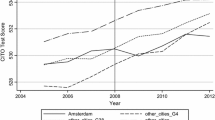Abstract
This article is part of a set of papers generated from a keynote presentation by Dr. Jack Frymier at the 1997 CREATE annual meeting. Dr. Frymier dealt with several reasons, that, as he saw it, invalidate the use of student achievement data in teacher accountability systems. This article first notes problems with Dr. Frymier's conception of accountability. Next, it summarizes some of the recent evidence showing the strong connection between school and teacher effectiveness measures and student achievement. It then notes some of the benefits of school and teacher effectiveness measures external to their function as measures of performance. Next, policy issues arising from the use of student data and the associated research are considered. Finally, it concludes with some cautions about using effectiveness measures in teacher accountability systems.
Similar content being viewed by others
References
Bearden, D. (1997). An overview of the elementary mathematics program 1996-97. Research report REIS97-116-3. Dallas: Dallas Public Schools.
Bembry, K., Jordan, H., Gomez, E., Anderson, M., & Mendro, R. (1998). Policy implications of long-term teacher effects on student achievement. Paper presented at the Annual Meeting of the American Educational Research Association, San Diego, CA, April 13-17.
Cross, C., & Joftus, S. (1997). Are academic standards a threat or an opportunity? Bulletin of the National Association of Secondary School Principals, 81(590), 12–20.
Darling-Hammond, L. (1997). Toward what end? The evaluation of student learning for the improvement of teaching in J. Millman (ed.), Grading teachers, grading schools. Newbury Park, CA: Sage.
David, J. (1987). Improving education with locally developed indicators. New Brunswick, NJ: Center for Policy Research in Education, Eagleton Institute of Politics, Rutgers, the State University of New Jersey.
Felter, M., & Carlson, D. (1985). Identification of exemplary schools on a large scale. In Austin & Gerber (eds.), Research on Exemplary Schools. New York: Academic Press.
Freeman, C., & Sokoloff, H. (1995). Toward a theory of thematic curricula: Constructing new learning environments for teachers and learners. Education Policy Analysis Archives, 3(14), 17. (Internet Journal).
Frymier, J. (1997). Accountability and student learning. A keynote paper presented at the Sixth Annual National Evaluation Institute sponsored by CREATE, Indianapolis, IN, July 1997.
Glass, G. (1990). Using student test scores to evaluate teachers. In J. Millman & L. Darling-Hammond (eds.), The new handbook of teacher evaluation. Newbury Park, CA: Sage.
Haney, W., & Madaus, G. (1989). Searching for alternatives to standardized tests: Whys, whats, and whithers. Kappan, 70(9), 683–687.
Jordan, H., Mendro, R., & Weerasinghe, D. (1997). Teacher effects on longitudinal student achievement. A paper presented at the Sixth Annual National Evaluation Institute sponsored by CREATE, Indianapolis, IN, July 1997.
Kirst, M. (1986). New directions for state education data systems. Education and Urban Society, 18(2), 343–357.
Mendro, R. (1997). Summary of common features of standards-based schools. Dallas TX: Dallas Public Schools.
Millman, J. (Ed.) (1997). Grading teachers, grading schools. Newbury Park, CA: Sage Publications.
Murname, R. (1987). Improving education indicators and economic indicators: The same problems? Educational Evaluation and Policy Analysis, 9, 101–116.
Raudenbush, S., & Bryk, A. (1989). Quantitative models for estimating teacher and school effectiveness. In R.D. Bock (edc.), Multilevel Analysis of Educational Data. San Diego, CA: Academic Press.
Sanders, W., & Horn, S. (1993). The Tennessee Value-Added Assessment System (TVAAS): Mixed Model Methodology in Educational Assessment. Knoxville, TN: University of Tennessee.
Sanders, W., & Rivers, J. (1996). Cumulative and residual effects of teachers on future student academic achievement. Knoxville, TN: University of Tennessee.
Sanders, W., Saxton, A., & Horn, S. (1997). The Tennessee Value-Added Assessment System: A quantitative outcomes-based approach to educational assessment. In J. Millman (ed.), Grading teachers, grading schools. Newbury Park, CA: Sage Publications.
Senate Bill 95-1, (1995). A bill enacted by the 95th session of the Legislature of the State of Texas, Austin, TX.
Skinner, B. (1953). Science and Human Behavior. New York: Macmillan.
Sykes, G. (1997). On trial, the Dallas Value-Added Accountability System in J. Millman (ed.), Grading teachers, grading schools. Newbury Park, CA: Sage Publications.
Thum, Y., & Bryk, A. (1997). Value-Added Productivity Indicators in J. Millman (eds.), Grading Teachers, Grading Schools. Newbury Park, CA: Sage Publications.
U.S. Department of Education. (1992). Hard work and high expectations: motivating students to learn. Washington D.C.: USDOE Office of Educational Research and Improvement.
Webster, W., & Mendro, R. (1997). The Dallas Value-Added Accountability System. In J. Millman (ed.), Grading teachers, grading schools. Newbury Park, CA: Sage Publications.
Webster, W., Mendro, R., Bearden, D., Bembry, K., & Jordan, H. (1997). Rewarding Effective Schools–Theory and Practice in an Outstanding Schools Awards Program. Paper presented at the Annual Meeting of the American Educational Research Association, Chicago, IL, March 24-28.
Webster, W., Mendro, R., Orsak, T., & Weerasinghe, D. (1998). An application of hierarchical linear modeling to the estimation of school and teacher effect. Paper presented at the Annual Meeting of the American Educational Research Association, San Diego, CA, April 13-17.
Webster, W., & Olson, G. (1988). A quantitative procedure for the identification of effective schools. Journal of Experimental Education, 56, 213–219.
Webster, W., & Schuhmacher, C. (1973). A unified strategy for systemwide research and evaluation. Educational Technology, 13(5), 68–72.
Author information
Authors and Affiliations
Rights and permissions
About this article
Cite this article
Mendro, R.L. Student Achievement and School and Teacher Accountability. Journal of Personnel Evaluation in Education 12, 257–267 (1998). https://doi.org/10.1023/A:1008019311427
Issue Date:
DOI: https://doi.org/10.1023/A:1008019311427




